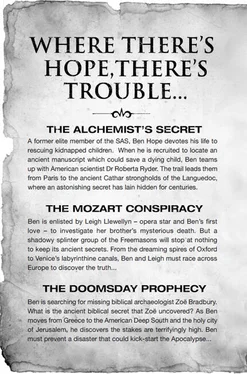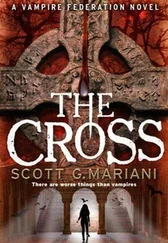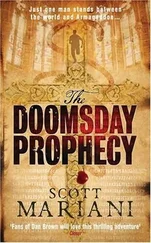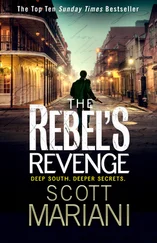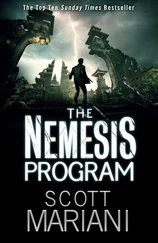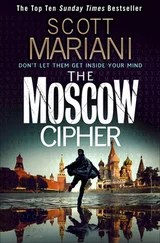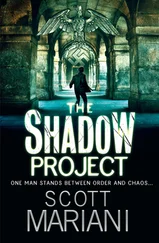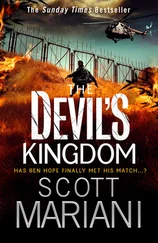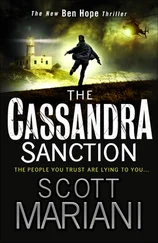‘Tara,’ she replied after a beat. ‘Tara McNatten.’
‘If you’re going to fire that thing, Tara, you need to do it before the police turn up. It won’t suit either of us to be caught standing here.’
She glanced over her shoulder, not quite long enough for Ben to move for the gun. ‘Okay,’ she said, appearing to make a decision. ‘You want to see Fergus Doyle. I’ll take you to him. That way.’ She motioned with the gun.
‘What about your friends here?’ he said, looking down at the two captives lashed to the bollard, still struggling wildly to get free and moaning loudly behind their gags.
‘Those are no friends of mine,’ she said. Ben didn’t understand, but there wasn’t time to hang around discussing the finer points. The police sirens were getting close.
He started walking the way Tara was pointing. She followed a few steps behind, keeping her revolver aimed steadily between his shoulder blades. The first police vehicle screamed to a halt and they could hear raised voices and the crackle of radios. Tara guided Ben into the entrance of a winding passage that snaked along between grimy houses and rundown fences for a hundred yards before it opened onto another dismal street. Parked a short distance away was a silver Honda SUV. There was nobody else in sight.
‘That’s my car,’ she said. ‘You’re driving.’ She kept the gun carefully trained on him as he opened the driver’s door. He could tell she wasn’t too experienced at this, but one thing she was was thoughtful. If she’d tossed him the key before he got behind the wheel, he might have been able to get the vehicle fired up and speed away without her; instead she waited until they were both inside, him in front and her behind, and only then did she let him have the key. ‘Go easy,’ she said. ‘Keep to the speed limits. Any tricks and I’ll shoot.’
Ben started the car and pulled away. Following her directions he drove through the maze of streets and back out onto the main road, where they passed the police vehicles speeding in the opposite direction towards the scene of the shooting. Cops were like wasps. If you acted unconcerned about their presence, there was generally a pretty good chance they’d leave you alone. Ben drove the Honda at a steady, nonchalant pace and managed to get by the police without getting stopped.
After a few minutes they were heading out of Belfast. A thin rain started up again, slanting out of the grey afternoon sky. Signs for Dromore and Banbridge flashed past. ‘Keep going,’ Tara’s voice said from the back seat. Finally, she said, ‘Okay, next right,’ and Ben turned off the main road to wind along a few miles of narrow country lanes. ‘See that stand of trees up ahead?’ she said. ‘There’s a gate just after them.’
The gate led to a bumpy track and into a farmyard that had seen better days. ‘This is it,’ she told him. ‘Pull up by the barn over there. Stop the engine and give me back the key. Right. Now get out.’
Ben did as he was told, glancing around him as he stepped out onto the hardcore yard. He’d more than half expected to be greeted by a bunch of hard-faced guys toting sawn-off shotguns and pistols – maybe Flanagan among them, if he’d made it to the getaway van, still nursing his punctured glute and mad for revenge.
As it was, there was no sign of life in the place. A heavy silence hung over the dilapidated outbuildings and the old farmhouse. Ben was baffled, but said nothing.
Tara climbed out of the car, holding the .357 more loosely now but still watching him closely. ‘Over to the house,’ she directed him, and made him stand a few paces away as she unlocked the front door. It swung open with a creak and she motioned for Ben to go in first.
The farmhouse was sparsely furnished and the decor hadn’t been refreshed since about 1956, but it smelled clean. Tara walked Ben down a passage to a laminated door, from behind which he could hear the sound of a TV. Beyond the door was a small sitting room, dark with the curtains drawn. Tara waved Ben inside.
Sitting slumped and immobile in a chintzy elbow chair, half silhouetted by the glow of the television screen and the light of a dim table lamp behind him, was the room’s only occupant. The old man didn’t respond as they walked in. His eyes were closed, his jaw hanging slackly half-open with a trail of drool running down off his chin. His white hair was shaggy and unkempt, and his body looked wasted and withered under his clothes as if he’d been sitting there for years on end.
At first Ben thought he was dead, but then saw the very slow, very shallow rise and fall of his emaciated chest as he slept. The table behind him was almost completely covered with an array of tubs and bottles of medicines.
Tara padded over to the TV and switched it off. With great care and gentleness, she plucked a tissue from a box on the table and used it to clean up the dribble of saliva from the old man’s mouth and chin. Then she turned to Ben. ‘Here he is,’ she said in a low voice. ‘Fergus Doyle. My uncle.’
Chapter Nineteen
Ben looked at her and saw she was totally earnest. The revolver was uncocked now, and pointed at the floor rather than at him. He took a step closer to the old man’s chair, softly so as not to wake him, and ran his eye over the collection of medicine bottles that littered the table. Among them was a doctor’s prescription. He picked it up, held it in the light of the lamp and saw the name on it: Fergus R. Doyle, with his date of birth.
‘Satisfied?’ Tara asked.
Ben replaced the slip of paper on the table and peered more closely at the old man. Under the mass of wrinkles was the same ugly, mean-looking face he’d studied in the photos earlier that evening. It was Doyle, for sure. He wasn’t seventy yet, but he looked well over ninety. Whatever disease had struck him down had caused terrible ravages, and judging from the quantity of painkillers on the table his waking hours must have been filled with agony.
‘All right,’ Ben said.
‘Now you see him,’ Tara said. ‘You can see how harmless he is. You can see how stupid and impossible it is that he could ever be a threat to anyone any more, and how he couldn’t have taken anything from you. You can see it, can’t you?’
Behind the old man’s chair was a shelving unit crammed with books. Ben noticed several titles about multiple sclerosis, and another called Stroke Recovery: A Patient’s Guide . But the majority of Doyle’s reading material was composed of evangelical Christian literature. The nearby sideboard was covered with more pamphlets and leaflets, as well as a copy of the Bible so well thumbed that its cover was mostly tape.
‘He’s peaceful,’ Tara said. ‘I don’t want to wake him.’ She motioned towards the door. ‘We can talk in the other room.’
The other room was a tiny kitchen. The table was blue Formica and the linoleum was ridged and cracked, but everything was clean and tidy. ‘I come here to look after him,’ she explained. ‘A nurse visits a couple of times a week, but I do the cleaning and stuff, see to it that he eats properly.’
‘What happened to him?’ Ben asked, still trying to understand.
‘The multiple sclerosis was diagnosed more than fifteen years back. Then about six years ago he had his stroke. Since then, he’s done little but sit in that chair and watch TV. I don’t even think he understands much of what he’s seeing any more.’
Ben was silent.
‘I know he was a bad man once,’ Tara said. ‘Like, really really bad. I’ve heard the stories. But he’s not like that now. I was still just a wee girl when he turned his back on violence and found God. Please believe me. He wouldn’t harm a fly, even if he could. He’s my uncle and I love him.’
Читать дальше
Конец ознакомительного отрывка
Купить книгу
